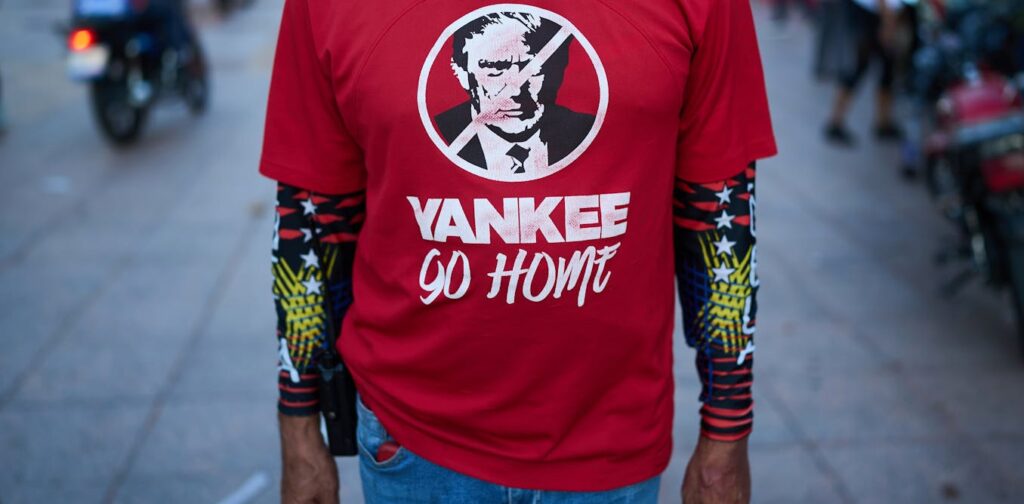
In a significant escalation of military action, the Trump administration has conducted airstrikes against over a dozen boats off the coasts of Venezuela and Colombia, leading to the deaths of more than 60 individuals. The U.S. government justifies these operations as necessary to combat drug trafficking. However, Colombian President Gustavo Petro has condemned the attacks, accusing the U.S. of “murdering” its citizens and undermining Colombia’s sovereignty.
The U.S. has a long history of intervention in Latin America, dating back to the early 19th century. The roots of American involvement can be traced to the Monroe Doctrine, proclaimed by President James Monroe in 1823, which sought to prevent European interference in the Western Hemisphere. This doctrine laid the groundwork for future U.S. expansionism and military interventions across the region.
By 1904, President Theodore Roosevelt expanded on the Monroe Doctrine, asserting the U.S. right to “police” the hemisphere in cases of “flagrant wrongdoing or impotence.” This justification for intervention has often led to violent upheavals, including revolutions and coups, and has resulted in what some analysts now label illegal extrajudicial killings.
Under President Trump, a new phase of the Monroe Doctrine appears to be emerging. The administration’s current strategies seem to focus on overt military force and escalating tensions, raising concerns about a potential larger military operation targeting Nicolás Maduro, the president of Venezuela. The Pentagon recently deployed the aircraft carrier USS Gerald Ford along with a fleet of warships to the Caribbean, joining approximately 10,000 troops already stationed in the region. This military buildup is ostensibly aimed at combating “narcoterrorism,” but many experts interpret these actions as preparations for a possible invasion.
The Trump administration has already authorized covert operations in Venezuela and has placed a bounty of $50 million on Maduro’s head, reflecting the administration’s aggressive posture towards the embattled leader. While Maduro’s government has faced allegations of electoral fraud and oppression of dissent, the U.S. approach also targets Colombia’s Petro, who has been democratically elected. Trump has referred to Petro as a “thug” and an “illegal drug leader,” and has imposed sanctions on him and his cabinet, citing alleged complicity in drug trafficking.
Petro has countered these claims, suggesting that Trump aims to interfere in Colombia’s upcoming elections to destabilize democracy in the country, thereby facilitating U.S. access to Venezuela’s oil reserves.
The historical context of U.S. intervention in Latin America provides a cautionary tale. Past actions have often resulted in unintended consequences, or “blowback,” as noted by the CIA. Mexico and Nicaragua serve as prime examples of how U.S. policies can spiral into chaos rather than order.
The Mexican-American War (1846-1848) exemplifies the consequences of U.S. expansionism. Following the conflict, the U.S. acquired 55% of Mexico’s territory. In 1911, U.S. involvement in the assassination of President Francisco I. Madero further destabilized the country, leading to decades of civil strife. The U.S. military intervention in Veracruz in 1914 aimed to depose a leader it had previously supported, ultimately resulting in widespread civilian casualties and a prolonged civil war.
Similarly, Nicaragua’s tumultuous history with the U.S. began in 1909 when Washington assisted in ousting President José Santos Zelaya over canal negotiations. The resulting U.S. military occupation, which lasted intermittently for more than 20 years, was framed as a mission to maintain stability but primarily aimed to protect American interests. The legacy of this intervention includes the rise of the Somoza dictatorship and the guerrilla warfare led by Augusto César Sandino, whose struggle inspired future movements against U.S. influence.
The U.S. intervention in Nicaragua during the 1980s, via support for the Contras, was later deemed illegal by the International Court of Justice, which ruled that Washington had violated international law. Despite the court’s ruling, the Reagan administration continued its policies, illustrating a persistent disregard for international norms.
Today, the repercussions of U.S. policy in Latin America remain evident. The ongoing interventionist approach threatens not only political stability but also the moral authority the U.S. once claimed as a champion of democracy and liberty. The current trajectory of the Trump administration’s actions suggests a repetition of historical mistakes, with the potential for significant political and humanitarian fallout.
As the situation unfolds, the implications of U.S. military intervention in Latin America will likely extend beyond immediate political gains, raising questions about the long-term impact on regional stability and U.S. credibility.






